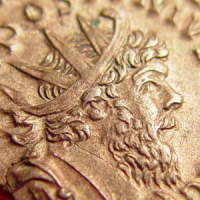Postumus

Marcus Cassianius Latinius Postumus († 269 in Mogontiacum ( Mainz )) was a usurper against Emperor Gallienus in the west of the Roman Empire and the founder and first emperor of the so-called Gallic Special Empire ( Imperium Galliarum ). As such, he ruled from 260 to 269.
Life
Little is known of Postumus' early years. It is believed that he was originally from Gaul , was of humble origins, rose to the highest positions in the army and perhaps even made it to governor of one of the two Germanic provinces .
The usurpation

Since the rightful Emperor Gallienus was busy with the Sassanids after the capture of his father Emperor Valerian in the Battle of Edessa in the east , he left his son Saloninus as sub-emperor with proven commanders as advisors, including Postumus, to protect the constantly threatened Rhine border. After an invasion by the Alamanni and Franks , the units of the Postumus had captured Frankish looters laden with booty before they could flee across the Rhine to their homeland. This booty should then be divided among the soldiers. However, this led to a conflict with Saloninus and the Praetorian prefect Silvanus, who they wanted to withhold in favor of the state treasury. Postumus then besieged the Colonia Agrippina ( Cologne ), the residence of Silvanus and Saloninus. When his troops stormed the city after a short siege, the two were murdered. Postumus was proclaimed Augustus by his soldiers . Later, Postumus also had a triumphal arch built to celebrate this victory.
Postumus was recognized as the new emperor by almost all provinces of Gaul , Hispania , Germania and Britain . For a short time his empire also included Raetia , this was proven in 1993 by the discovery of the Augsburg Victory Altar. Because of its strategically important location, Cologne was designated the residence and seat of administration (with its own senate , consuls and Praetorian Guard ) of his new empire.
Decisive for this choice were the new mints of the city that Gallienus set up. Postumus was celebrated on his coins as the savior of Gaul, an honorary title that he had probably accepted after the successful defense of the Rhine Limes against the Teutons . Postumus' coin issues were initially of good quality, but deteriorated rapidly towards the end of his reign due to massive financial problems, so that the late Antoninian coins consisted only of inferior bronze.
In 262 and 263, Postumus led, among other things, successful campaigns against the Alamanni and Franks, which then remained quiet for a long time. He also improved the border protection by building a second line of defense further in the hinterland. In 265 Gallienus, who had probably already started a first offensive against his rival in 261, led a second (?) Campaign against Postumus, which probably brought Raetia or at least its important Alpine passes back to Rome. However, after he was wounded in battle, he had to break off the campaign, as he was now more urgently needed on the Danube border. Aureolus , one of Gallienus' generals and commander of the troops in Mediolanum ( Milan ), then rebelled against him and allegedly allied himself with Postumus. Nevertheless, this Aureolus refused to support, when he was soon trapped and besieged in the city by Gallienus. In 268, both Aureolus and Gallienus were murdered by their own men. Gallienus' successor was Claudius Gothicus .
The end of the postumum
Postumus was finally challenged by a usurper himself in 269: Laelianus , commander of the troops in Mogontiacum (Mainz), the metropolis of the province of Germania superior , was proclaimed emperor by his soldiers. Postumus acted immediately and was soon able to retake Mogontiacum , where Laelianus was killed. However, since Postumus refused his soldiers the usual looting, they rebelled and killed him. It is possible that he had sympathizers of Laelianus in his own ranks who carried out an assassination attempt on him. The former explanation, however, seems more plausible - banning victorious legionnaires from plundering was in fact equivalent to suicide at the time.

After the death of Postumus, Britain and Hispania fell from the Imperium Galliarum . His successor, Marcus Aurelius Marius , only controlled Gaul and the Rhine Limes. The residence and parts of the coinage were later moved to Augusta Treverorum ( Trier ).
swell
A - albeit very unreliable - source about Postumus' life provides the
- Historia Augusta ( Thirty Tyrants 3)
which ascribes a son and co-regent of the same name to Postumus ; compare also the very brief information in Aurelius Victor and Eutropius .
literature
- John F. Drinkwater: The Gallic empire. Separatism and continuity in the North-Western provinces of the Roman empire AD 260-274 (= Historia Einzelschriften. Volume 52). Steiner, Stuttgart 1987, ISBN 3-515-04806-5 .
- Ingemar König : The Gallic usurpers from Postumus to Tetricus (= Vestigia. Volume 31). CH Beck, Munich 1981, ISBN 3-406-04801-3 .
Web links
- Michel Polfer: Short biography (English) at De Imperatoribus Romanis (with references).
- Aureus des Postumus - 3D model in the culture portal bavarikon
Individual evidence
- ↑ Lothar Bakker: Raetien under Postumus - The victory memorial of a Juthung battle in 260 AD from Augsburg. In: Germania , Volume 71 (1993), pp. 369-386; Ingemar König : The Postumus inscription from Augsburg. In: Historia. Ancient History Journal . Volume 46 (1997), pp. 341-354 (JStore) .
| predecessor | Office | successor |
|---|---|---|
| Valerian and / or Gallienus |
Emperor of the Imperium Galliarum 260–269 |
Laelianus and / or Marcus Aurelius Marius |
| personal data | |
|---|---|
| SURNAME | Postumus |
| ALTERNATIVE NAMES | Postumus, Marcus Cassianius Latinius |
| BRIEF DESCRIPTION | Emperor of the Imperium Galliarum |
| DATE OF BIRTH | 2nd century or 3rd century |
| DATE OF DEATH | 269 |
| Place of death | Mainz |

